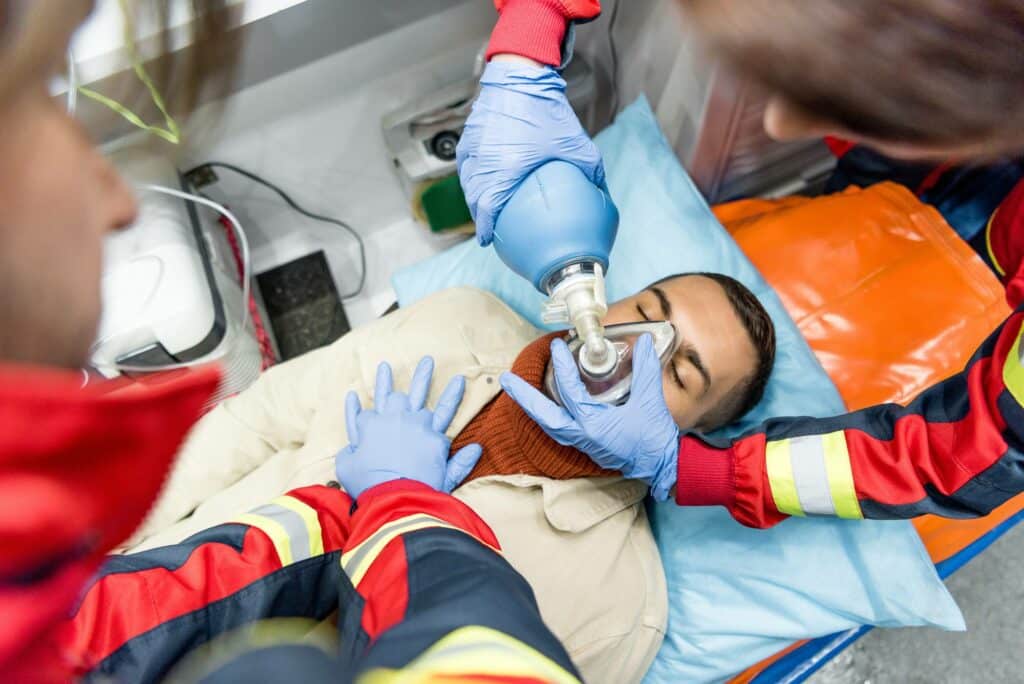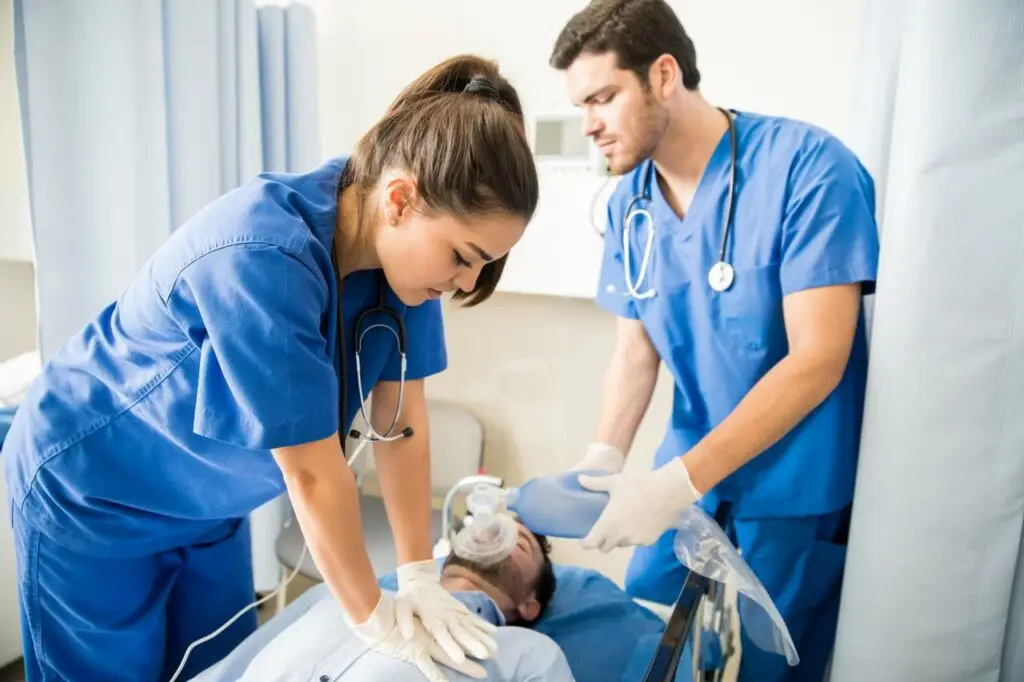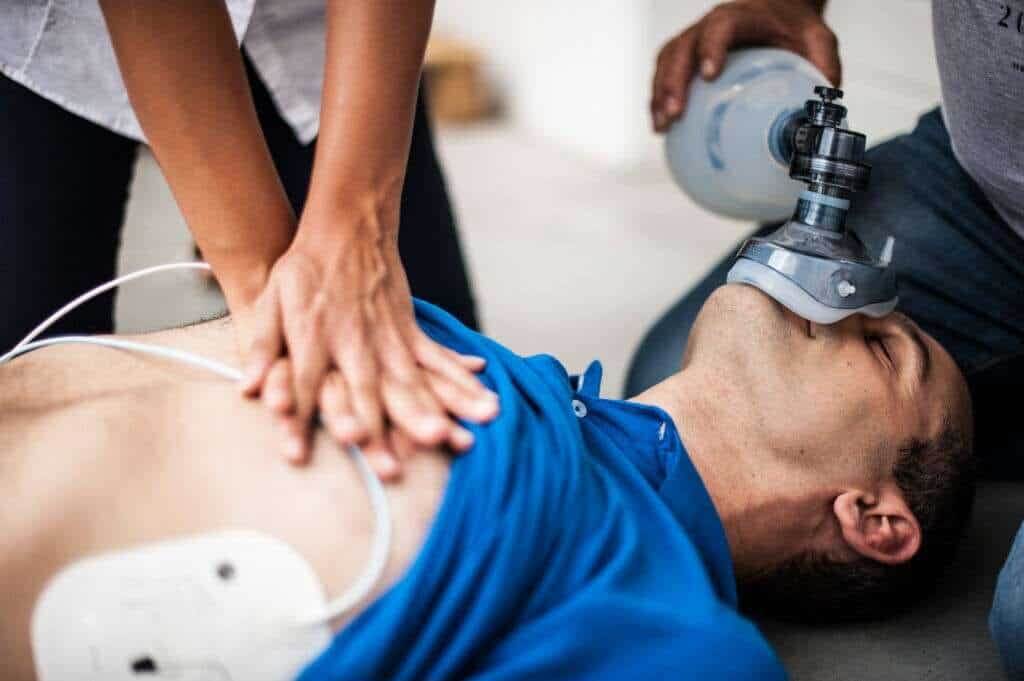AHA BLS
Certification In Crawfordsville
Midtown CPR AHA BLS Certification Requirements in Crawfordsville
Therefore, AHA BLS Certification by the American Heart Association Basic Life Support for Healthcare Providers classroom course is designed to provide a wide variety of healthcare professionals the ability to recognize several life-threatening emergencies, provide CPR, use an AED, and relieve choking in a safe, timely, and effective manner. In addition, AHA BLS certification for healthcare providers is one of the most popular AHA courses taught across the country. As a matter of fact, healthcare providers such as EMTs, paramedics, ER physicians, and other healthcare providers are REQUIRED to have valid, up-to-date American Heart Association BLS certification.
Midtown CPR provides BLS nursing certification for students entering the nursing field. In addition, we also offer renewal BLS nursing certification. The American Heart Association BLS certification is the most recognized and required certification for allied professionals.
HeartCode BLS is the AHA’s blended learning delivery method for the BLS Course. HeartCode blended learning delivers quality resuscitation education regardless of where providers are located and gives them more control to complete the course at their own pace. Providers first complete the online portion of HeartCode BLS and then complete a hands-on skills session with an AHA BLS Instructor or on a simulation station.

Healthcare Provider AHA BLS Certification In Crawfordsville
This AHA BLS CPR class is required by healthcare providers such as nurses, doctors, paramedics, dentists, hygienists, pharmacists, and all other healthcare professionals who need an American Heart Association CPR BLS Certification training class for infants, adults, and children. In addition, this course provides Automated External Defibrillator (AED) training, rescue breathing, and choking rescue protocols.
Medical Professionals
This AHA BLS CPR class is required by healthcare providers such as nurses, doctors, paramedics, dentists, hygienists, pharmacists, and all other healthcare professionals who need an American Heart Association CPR BLS Certification training class for infants, adults, and children. In addition, this course provides Automated External Defibrillator (AED) training, rescue breathing, and choking rescue protocols.
Students
Basic Life Support (BLS) is the CPR class required for Students in Healthcare and Medical Related Programs. Therefore, this class is American Heart Association certified and satisfies all CPR requirements for nursing school, medical school, dental school, pharmacy school, and all other healthcare-related school programs in Memphis, TN. Midtown CPR is very accommodating when it comes to your AHA BLS Certification needs.
Midtown AHA CPR & BLS Certification Services In Crawfordsville
Midtown CPR BLS Certification class satisfies all the requirements for the following school programs: Nursing, Dental, EMT, Paramedic, Radiologist, Respiratory Therapy, CNA, Pharmacy, Hygienist, and more… Let Midtown CPR get you ready for any emergency that may arise.
AHA BLS Certification
$89
-
AHA BLS Certification -
AHA 2020 Guidelines -
Required by colleges -
Feedback Devices -
AED Training -
Choking First AID -
Hands on
Group AHA BLS Certification
$75
-
AHA BLS Certification -
AHA 2020 Guidelines -
Required by colleges -
Feedback Devices -
AED Training -
Choking First AID -
5 or More
Home Health CPR AED & First Aid
$99
-
CPR AED & First Aid -
Daycare, Home Health -
ElderCare, LayPeople -
Caregivers, Sitters -
Choking First Aid -
Feedback Devices -
AED Training
CPR AED & First Aid
$99
-
CPR AED & First Aid -
Daycare, Home Health -
ElderCare, LayPeople -
Caregivers, Sitters -
Choking First Aid -
Feedback Devices -
AED Training
Frequently Asked Questions
What does the acronym "AHA" stand for?
American Heart Association
Who should learn CPR?
Everyone. Regardless of particular job requirements, anyone with a family should learn CPR, because 85% of cardiac arrests occur at home. If something happens to a loved one, there is nothing worse than not knowing what to do in an emergency situation. At the very least, keep a first aid kit in your home and vehicle and know how to administer basic chest compressions while waiting for emergency responders. This could mean the difference between life and death for your child, parent or spouse, or even for yourself.
What are the basic steps of CPR?
Check that the area is safe, then perform the following basic CPR steps:
- Call 911 or ask someone else to.
- Lay the person on their back and open their airway.
- Check for breathing. ...
- Perform 30 chest compressions.
- Perform two rescue breaths.
- Repeat until an ambulance or automated external defibrillator (AED) arrives.
When should CPR be performed?
Steps to help a person having a cardiac arrest are listed below.
- If you see someone collapse, check to see whether the person responds to shouting and tapping on their body. Check for breathing and a pulse. If the person is not breathing normally and if they do not respond, call 9-1-1for help.
- Start CPR.
- Locate an AED. Follow the AED’s verbal instructions to deliver a shock to restart the heart of the affected person.
- Continue CPR until first responders arrive and take over. First responders will continue CPR and may use an AED to give more shocks to restore the affected person’s heart rhythm. They may also give medicines through an intravenous (IV) line.
How long should I perform CPR on someone?
The CPR can be stopped if
- the ambulance arrives and trained medical staff take over, or
- the person who you are helping shows signs of consciousness or starts breathing normally again.
- If they stay unconscious despite breathing normally, put them in the recovery position.
- If you’re too exhausted to carry on doing chest compressions, that’s an acceptable reason to stop as well.
What should I do if the person is not responding to CPR?
- When a doctor—or some other appropriate emergency medical provider, like a paramedic—tells you to stop.
- When you become exhausted and cannot continue (this gets messy, as we'll see below).
- When the patient begins yelling at you to stop hitting him in the chest (this really happens). In other words, when the patient gets better.
Can CPR save someone's life?
AHA CPR, especially if administered immediately after cardiac arrest, can double or triple a person's chance of survival. According to 2021 US data for adult OHCA only, survival to hospital discharge was 9.1% for all EMS-treated non-traumatic OHCA cardiac arrests.
How effective is CPR?
According to the CDC, Currently, about 9 in 10 people who have cardiac arrest outside the hospital die.2 But CPR can help improve those odds. If it is performed in the first few minutes of cardiac arrest, CPR can double or triple a person’s chance of survival.
The initial success rate of cardiopulmonary resuscitation was equal to 15.3%, while the ultimate success rate (discharged alive from the hospital) was as 10.6%. The six-month success rate after resuscitation was 8.78% than those who were discharged alive. There were no significant statistical differences between different age groups regarding the initial success rate of resuscitation (P = 0.14), and the initial resuscitation success rate was higher in patients in morning shift (P = 0.02).
What are the risks of performing CPR?
CPR can break ribs and cause severe pain. Survivors likely face a long hospital stay and rehabilitation. Complications of intubation and ventilation include damage to the teeth, voice box or lungs, pneumonias or other infections, and collapsed lungs.
What is the difference between CPR and basic life support (BLS)?
- The primary is that Basic Life Support (BLS) goes into additional detail regarding managing a cardiac event in a medical setting where you’re more likely to have access to medical equipment and more advanced lifesaving tools, and those with more medical training may be nearby.
- CPR courses are intended for people who will be helping “victims” outside of a clinical setting, the course you take may actually be CPR plus First Aid. In a course like this, you learn how to manage various medical emergencies in a non-medical setting while awaiting emergency responders.
What is BLS certification?
- The AHA’s BLS course trains participants to promptly recognize several life-threatening emergencies, give high-quality chest compressions, deliver appropriate ventilations and provide early use of an AED. Reflects science and education from the American Heart Association Guidelines Update for CPR and Emergency Cardiovascular Care (ECC).
What are the basic skills taught in BLS certification?
- High-quality CPR for adults, children, and infants
- The AHA Chain of Survival, specifically the BLS components
- Important early use of an AED
- Effective ventilations using a barrier device
- Importance of teams in multirescuer resuscitation and performance as an effective team member during multirescuer CPR
- Relief of foreign-body airway obstruction (choking) for adults and infants
Can I still provide BLS if my certification has expired?
- No, When you receive your BLS certification, it is good for a certain period of time. Once the time has elapsed, you will need to recertify if you wish to maintain access to patients and continue working in this field. Otherwise, you could be putting lives at risk! If your current cert expires soon or already has expired (you can check by looking up the expiration date on your card), there are some things that must take place before you’re allowed back into patient rooms.
- First things first: always confirm with facility policy as each hospital/clinic should have its own unique requirements when it comes to getting re-certified.
- Secondly, you will need to complete a course and pass an exam in order to recertify your BLS. A new certification period is not automatic: it doesn’t simply start when the old one expires. You must go through this process again by taking a training class or online program and passing an assessment test before being allowed back into patient rooms.
Can I get BLS certified if I have a disability?
- The Advisor: Basic Life Support (BLS) program was developed for candidates who pass the cognitive portion of the HeartCode® BLS Provider Course but cannot independently perform the physical skills of CPR.
- By successfully advising others how to perform CPR and use an automated external defibrillator (AED), people with physical disabilities can receive an Advisor: BLS card.



Get Certified with the Best CPR Training in Memphis, TN
If you’re seeking trusted, fast, and affordable CPR certification in Memphis, TN, Memphis Midtown CPR is your go-to provider. We offer top-tier, American Heart Association (AHA) BLS certification, designed for healthcare professionals, students, first responders, and workplace teams. Our comprehensive BLS CPR certification training in Memphis includes essential lifesaving skills, such as CPR and AED training, basic life support for healthcare providers, and CPR renewal courses tailored to meet licensing and job requirements.
Whether you’re a medical student, a local business needing group training, or an individual looking to renew your certification, we offer blended online and hands-on CPR certification classes in Midtown Memphis that fit your busy schedule. As a locally owned business trusted across Shelby County, we provide AHA-compliant CPR and BLS classes with expert instructors and the ability to earn your same-day certification. Join the many hospitals, clinics, and schools that trust Memphis Midtown CPR for high-quality, community-focused training.
Locally Owned and Committed to Your Health
Memphis Midtown CPR is proud to be locally owned and operated. We’re not franchised and are not affiliated with any national chains. Our family is deeply rooted in the healthcare industry, passionate about education, and committed to helping improve the health of the community. We live in Midtown Memphis, and all of us are graduates of Memphis and Shelby County Schools.
The Importance of CPR and BLS Training in the Community
As public health challenges evolve from infectious to chronic diseases like heart disease, stroke, and hypertension, basic life support training in Memphis is more essential than ever. Our mission is to empower the community with critical emergency response skills and promote wellness through education. Thanks to increased awareness of obesity-related illnesses, Memphis is embracing healthier habits, with more bike lanes, walking trails, and fitness centers popping up around the city. We’re proud to play our part in this movement by offering high-quality CPR and BLS certification in Memphis, TN.
